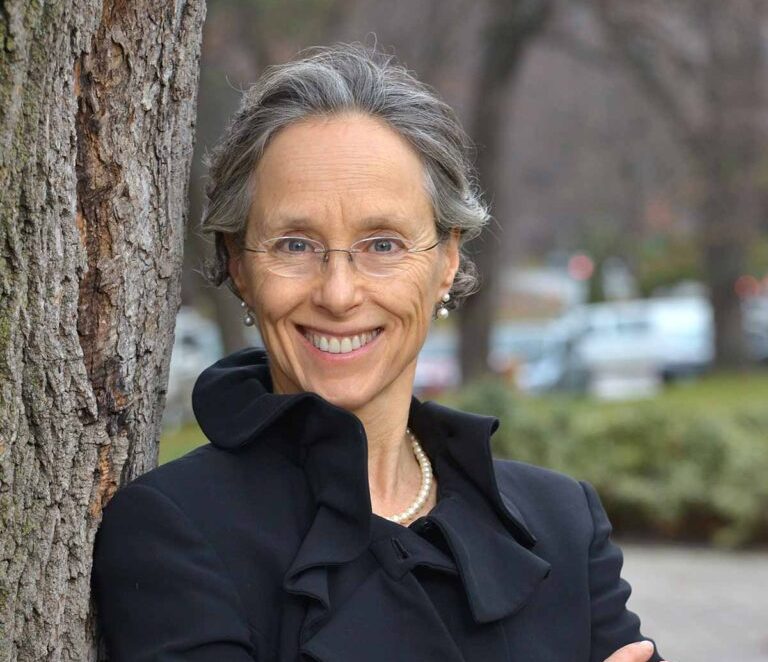Dianne Saxe, one of the Ontario Green Party’s two deputy leaders, says it was her Jewish values that helped made her a committed environmentalist.
“This is what my father taught me from the very beginning: tikun olam. We may not be able to do the whole job, but we’re not free to stand aside,” Saxe told The CJN. “We must stand up. Those who can, must. And particularly people of my generation.
“Most of the real damage to the climate, to the environment, has occurred during my working lifetime. When we break something, we’re supposed to fix it.”
Saxe’s father, Morton Shulman, was also involved in Ontario provincial politics, having served as a New Democrat MPP from 1967 to 1975.
An environmental lawyer by trade, who was the province’s non-partisan environmental commissioner from 2015-19, Saxe decided to run for office when her position was eliminated by Premier Doug Ford. Her experience parallels her father’s, who ran for office after he was removed as the province’s chief coroner.
After her position was eliminated, she continued as a volunteer “people’s commissioner,” travelling around the province to discuss the urgency of climate action. This led her to the Greens, which she calls the “only party serious about a livable future.”
She is running in the University-Rosedale riding in the June provincial election, which is represented federally by Deputy Prime Minister Chrystia Freeland and provincially by New Democrat MPP Jessica Bell.
“Politics is a very tough place for anybody,” Saxe said. “It’s particularly tough for women. It’s particularly tough for Jews. It’s particularly tough for Jewish women who are speaking up for climate action and who are methodically all around the world subjected to vitriolic attacks and denigration.”
As a member of the provincial party, she said she’s detached from developments with the federal Greens, which has been marred by allegations of antisemitism stemming from internal disagreements over the Israeli-Palestinian conflict. The discord culminated in the resignation of Annamie Paul, the party’s first Jewish and Black leader. Saxe characterized Paul’s treatment as “terrible” and “heartbreaking.”
But Saxe claims these issues simply don’t exist in the provincial party. “I have not experienced the slightest trace of antisemitism. I have not seen any trace of racism,” she said.
“What I’ve seen is people bending over backwards, twisting themselves into knots to be respectful and inclusive and to understand the different kinds of pain that different communities have and to search and work for a better future as we move forward.”
“Passionate disagreements” about contentious issues aren’t unique to the Greens, she added, pointing to the dissension in the federal Conservative party that led to the ouster of former leader Erin O’Toole.
Saxe said she is a staunch supporter of Israel. And while she’s critical of some of its policies, and supports groups like the New Israel Fund that are dedicated to enhancing Jewish-Arab cooperation, she believes Israel’s harshest critics fail to appreciate that “Israel lives in one of the most dangerous neighborhoods in the world.”
“That’s relevant to the choices that they make,” she said. “I don’t live in that neighborhood. I don’t get to tell them what to do.”
But at the end of the day, she said her primary motivation is the climate crisis, which is multifaceted in its impact.
Rather than use the ongoing crisis in eastern Europe as a pretext for expanding fossil fuel production, as Alberta Premier Jason Kenney has suggested, Saxe said it ought to be a wake-up call to wean society off fossil fuels.
“We could see this moment as the pivot point to rapidly accelerate our conversion to renewable energy,” she said.
One solution is to curb urban sprawl, which Saxe calls a key plank in the Greens’ platform.
“Sprawl is our biggest problem. Sprawl is Ontario’s oilsands,” said Saxe, whose final report as environmental commissioner detailed the environmentally destructive impact of cities stretching out beyond their means.
“We need to provide places to live where people have what they need near them, that they don’t have to drive to,” Saxe said. “That will make communities much more vibrant and more fun places to live, with more local shops and more local opportunities to work…. And that allows us to then protect our woodlands, wetlands and forests, which we are going to desperately need, as the hammer blows of climate continue.”
Saxe criticized Ford’s move to spend $1.1 billion a year on waiving licence plate renewal fees. She said this will only strengthen Ontarians’ dependency on their personal vehicles at a time when we need to be shifting toward public transit.
The Greens are calling for those funds to go to funding a $6.6-billion mental health strategy over four years, which Saxe tied directly to the impacts of the pandemic and the climate crisis.
“Young people have depression and despair and rage and fear, all of them totally justified because people on the planet are getting clobbered,” she said. “And the leadership we’re getting from most of the political class, certainly including our Ontario premier, is criminal because we are pushing past our opportunity for a livable planet. We’re throwing it away. We’re stealing it from the young people.”
